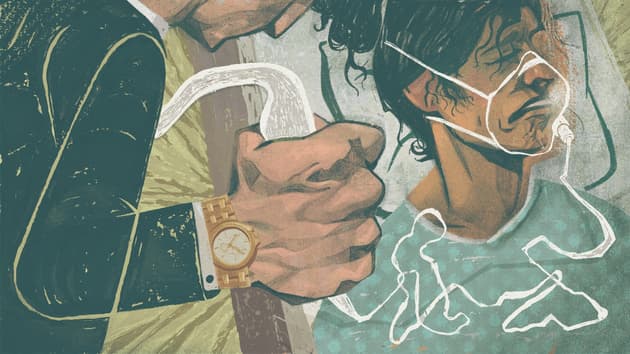
Community power, corporate change and courtroom justice: the Bureau’s impact in 2021
Collaboration, innovation and an understanding that the power to change the world does not rest solely with governments, millionaires and corporations, but at every level of society. These ingredients – added to the Bureau’s recipe of finding facts, uncovering wrongdoing and telling human stories – made the Bureau’s journalism more impactful than ever in 2021.
The Bureau’s investigations reached global audiences in their millions through partnerships with international, regional and specialist outlets across six continents. But to truly deliver on its mission to drive change through investigative journalism, the Bureau must do far more than only publish or broadcast stories. So, it also collaborated with people and organisations who used its work to advocate for change; adopted fresh ways of reporting and meaningful storytelling to make its journalism more useful to the people directly affected; and ensured its evidence and stories equipped people on the ground while holding those at the top to account.
That approach meant the Bureau’s work was used the world over to help drive positive change in laws, company policies, public health initiatives and, above all, people’s everyday lives. Here are some highlights:
 The Bureau exposed oxygen companies putting profit above patients by spreading misinformation in Mexico
Victor Bizar Gómez
The Bureau exposed oxygen companies putting profit above patients by spreading misinformation in Mexico
Victor Bizar Gómez
Changing corporate behaviour
Last June, two of the world’s biggest gas companies made landmark commitments to transform medical oxygen access in low- and middle-income countries – commitments that, if met, could save countless lives. The move followed the Bureau’s work in the area, which included revelations that those two companies were making profit margins of up to 88% on oxygen while patients across Africa were dying due to short and unaffordable supplies. The Bureau later revealed how gas companies were threatening and spreading misinformation to Mexican hospitals attempting to secure their own oxygen supplies. That evidence is now being used in an investigation by the country’s competition commissioner.
In other corporate impact:
As Deliveroo prepared to go public in what was hyped as the decade’s biggest London Stock Exchange flotation, the Bureau revealed riders were being paid as little as £2 an hour. Multiple investment firms said they would shun the company, and Deliveroo’s share price collapsed before the initial public offering.
In South Africa, the drug company Pfizer backed down from demanding state assets as indemnity against civil claims from citizens who had experienced adverse vaccine effects after the Bureau revealed it had put this clause into vaccine contracts with governments in Latin America.
- MEPs questioned Pfizer executives during a European parliament hearing about the Bureau’s findings that the drug company had “bullied” Latin American governments during Covid-19 vaccine contract negotiations.
The Bureau presented its findings on deforestation in UK soya supply chains to the Retail Soy Group, made up of the country’s biggest supermarkets. The same retailers later signed up to a new UK Soy Manifesto.
Strengthening justice
The Bureau launched one of the biggest court reporting projects ever undertaken in the UK. It trained reporters and sent them into the country’s possession courts to gather previously hidden data on the housing crisis and document how it was being affected by Covid-19. Journalists found people in dire financial straits were losing their homes in a matter of minutes because of a legal system that had failed to account for the catastrophic impact of the pandemic as judges were left powerless to prevent evictions.
Courts are meant to be open to anyone, but Bureau reporters were refused entry on numerous occasions and faced other significant barriers to getting information that is supposed to be in the public domain. Following publication of the investigation and details of the challenges journalists had faced, the two most senior judges in the country responded.
The lord chief justice, Lord Burnett of Maldon, said he was “disturbed” to hear of the problems the Bureau encountered and told the House of Commons justice committee that no one should be turned away from possession hearings. Meanwhile, the master of the rolls, Sir Geoffrey Vos, wrote to judges across the country to remind them that the press must have free access to all public court hearings.
In other legal impact:
The Bureau’s reporting on global food supply chains was used as evidence in strategic climate litigation.
Two women who had alleged they experienced domestic and sexual abuse at the hands of a fellow police officer, a story the Bureau exposed in October 2019, received a public apology from Gwent Police and had their case settled.
The Bureau won an appeal against Thurrock Council’s decision to keep secret hundreds of millions of pounds of investments they made using taxpayers’ money. More than two years after reporters first requested the information, they are still fighting through the courts to have the financial details released. The tribunal ruling, which the council is still appealing, should mean that councils have to be more transparent about their investments.
Unleashing community power
Equipping the people directly affected by the issues the Bureau covers with tools and knowledge they can use to create positive change themselves is just as important as trying to shape laws or policies. It’s an area the Bureau wants to build on in the coming year.
During two major investigations last year, the Bureau saw how powerful the approach can be. In one about gig economy pay, it worked with Deliveroo riders who had originally pitched the story as part of the Bureau’s Is Work Working? project. Using a tool developed by the Independent Workers’ Union of Great Britain, reporters gathered invoices from riders across the UK to build an unprecedented dataset of gig economy pay. At the same time, the riders were interviewing their fellow Deliveroo workers.
 The Bureau uncovered the barriers faced by undocumented migrants trying to access GP services and Covid-19 vaccines
Soofiya Andry
The Bureau uncovered the barriers faced by undocumented migrants trying to access GP services and Covid-19 vaccines
Soofiya Andry
The result was a package that received major global coverage, triggered a critical conversation about gig economy workers’ rights ahead of Deliveroo’s much-hyped LSE flotation, and put riders in a position where they had a much greater understanding of a previously opaque pay structure that was seriously impacting their lives. One of the riders who worked with the Bureau decided to become a journalist because of the experience.
In another investigation, into the barriers faced by undocumented migrants trying to access GP services and a coronavirus vaccine, the Bureau worked closely with grassroots organisations throughout, from building its methodology to reporting and disseminating the findings. That level of collaboration led to a gathering of evidence and multi-layered impact that would otherwise have been impossible.
More than 50 GP surgeries subsequently signed up to the Safe Surgeries initiative run by Doctors of the World, one of the Bureau’s key partners, for training and resources to help them ensure proper access for undocumented people. NHS England, clinical commissioning groups and politicians responded to the findings. But most powerfully of all, the Bureau heard multiple stories of undocumented people getting their vaccine after seeing the story and better understanding their rights.
Separately, a continued commitment to supporting local, community-based, public-interest journalism led to the launch of an ambitious sector-strengthening initiative, the People’s Newsroom. A team at the Bureau is setting out to build an infrastructure – think editorial resources and back-office and start-up support – to usher in a new era of community journalism. The initiative has already gained the support of more than 400 people, community groups and organisations, engaged directly with hundreds more through its event series and seen the launch of a pilot with the Ethnic Minorities and Youth Support Team in Swansea.
 The Bureau worked with BBC Panorama on an investigation into British American Tobacco in southern Africa and allegations of bribes offered to Robert Mugabe
Daniel Stolle
The Bureau worked with BBC Panorama on an investigation into British American Tobacco in southern Africa and allegations of bribes offered to Robert Mugabe
Daniel Stolle

Informing decision-makers
The Bureau’s Environment team has been investigating the devastating deforestation in global food supply chains for three years. Last summer, it published findings showing how the UK dairy industry was driving destruction in Brazil’s “second Amazon”, the Cerrado tropical savannah region that is home to 5% of the world’s plant and animal species. Cows producing milk for brands including Cathedral City cheddar, Cadbury chocolate and Anchor butter are fed on soya grown there by US grain giant Cargill, which is linked to recent forest clearance.
As politicians worldwide prepared for the Cop26 UN climate conference, where forests were among the five key agenda items, and as the UK and EU considered new legislation on deforestation in supply chains, the Bureau ensured its findings got to the right people at the right time. Briefings were given to environment minister Lord Goldsmith of Richmond Park and senior cross-party MPs and MEPs ahead of important debates. More than 100 world leaders later committed to halting and reversing deforestation and land degradation by 2030, in an agreement negotiated by Goldsmith.
Donate to the Bureau
Investigative journalism is vital for democracy. Help us to tell the stories that matter
Click here to support usIn other political and institutional impact:
The Bureau’s evictions work was cited four times in one week during select committee hearings and parliamentary debates. Maeve McClenaghan, the project’s lead reporter, supplied oral and written evidence to a justice committee inquiry on open justice.
Switzerland’s federal data protection and information commissioner opened an investigation focusing on a company the Bureau revealed had allegedly operated a service that helped governments secretly monitor mobile phones. An MEP later tabled a question for the European Commission on the matter.
The Bureau briefed former shadow attorney general Charles Falconer and other MPs on its findings that British American Tobacco had carried out wide-scale corporate espionage. Charles Falconer used this evidence to press the Serious Fraud Office (SFO) to take action.
In a letter to the Financial Times, Lisa Osofsky, the SFO’s director, responded to the Bureau’s report on the organisation being outgunned by lawyers working for corporate suspects. She rejected the claims of an imbalance of power but could not convincingly explain the difficulties at the agency.
The Bureau took the findings on barriers faced by undocumented migrants trying to access GP services directly to NHS England’s inclusion team. The health service is now working on better policies to improve access to primary care for marginalised groups.
The Bureau briefed the US government and accountability office on its findings about the failures of Covax, the ambitious global collaboration set up to give people in rich and poor nations equitable access to vaccines.
Supporting advocacy
The Bureau’s Global Health team produced a series of investigations looking at the pricing and tactics used by international oxygen companies. Lack of access to oxygen already caused many deaths worldwide before coronavirus hit; the pandemic made the situation even more desperate.
Throughout the series, the Bureau worked closely with Every Breath Counts, an international coalition of NGOs working to improve access to oxygen, to ensure the reporting got to the right people in the right format. The coalition used the Bureau’s findings in high-level advocacy and to engage with the gas industry. The two companies the Bureau had originally exposed went on to make a landmark commitment to transform access to oxygen in low- and middle-income countries worldwide.
In other advocacy impact:
The Drop JBS campaign by Mighty Earth, Greenpeace and others, which focuses on the world’s biggest meat producer and its repeated links to illegal deforestation, used the Bureau’s evidence.
Feedback, an NGO working to transform food systems, used findings from the Environment team’s investigations in its advocacy work with supermarkets.
We understand that several investors engaged with HSBC and other banks after we revealed they had tried to water down climate action.
John Bird, co-founder of the Big Issue, said of the evictions project: “One of the greatest pieces of journalism I’ve come across in a long, long time … This information you’ve come up with is gold dust, gold dust which is just what I need to throw at the eyes of the government.” The Bureau provided a briefing for the Big Issue to use at the Conservative party conference.
The Bureau’s Enablers team hosted a closed roundtable with campaigners, academics and lawyers to discuss what could be done about the questionable tactics used by British lawyers and private investigators representing foreign clients that were exposed in a joint investigation with the New York Times.
 The Environment team’s interactive postcards that were handed out during Cop26 and linked to the Snack-Man: Cheese v Trees game
Matt Fraser
The Environment team’s interactive postcards that were handed out during Cop26 and linked to the Snack-Man: Cheese v Trees game
Matt Fraser
Taking journalism off the page
If the Bureau’s investigative journalism is to reach and engage with people across society, thinking beyond traditional media outlets and formats is essential. Getting findings to people can take many different shapes and be much more direct than someone reading them in a newspaper.
During Cop26, the Environment team handed out postcards with a QR code on the back. That link took the reader to a version of the 1980s computer game Pacman, redesigned to tell the story of its latest investigation into how popular dairy products were driving deforestation in Brazil. Play the Snack-Man: Cheese v Trees game here.
Some other ways the Bureau’s investigations went into the world:
The Bureau Local team opened up its dataset on evictions and co-hosted an event with the Big Issue to show people and organisations how to use it in their work.
The Bureau’s journalists appeared as experts at specialist or community events, such as Business Green’s Net Zero Festival.
The Bureau produced an eight-part podcast telling the story of British American Tobacco’s corporate espionage scheme in South Africa.
Former Bureau reporter Alexandra Heal and her investigation into domestic and sexual abuse at the hands of police officers was the subject of a short Vice documentary.
Read more about the Bureau’s impact strategy here.
Header illustration credit: Daniel Stolle




